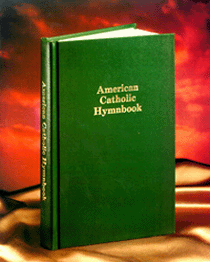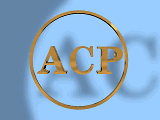American Catholic Press
16565 S. State Street, South Holland, Illinois 60473
|
||||||||||||||||||||
|
|
||||||||||||||||||||
|
||||||||||||||||||||
 American Catholic Hymnbook Another "book of song" for Roman Catholics in the United States? The field is already very crowded with competitors. Into this competitive and risky market American Catholic Press, a non-profit company, has bravely entered with American Catholic Hymnbook (ACH). The competitors already in the market have staked out their territory and are prepared to challenge ACH or any other contender who enters this crowded space. What qualities will distinguish ACH from its competitors? The editors of this publication would probably say that their hymnal can be combined with the Leaflet Missal prayerbook (published by the same company) to give a congregation the benefits of both a "permanent" and "flexible" repertory of song, but perhaps the most outstanding feature of ACH is the quality of the texts that a congregation will sing. According to the editors, ACH contains texts that reflect "a new tradition, now taking shape." Those who sing from ACH are "already part of the Church of tomorrow." To prepare congregations for this "Church of tomorrow" the editors of ACH have rejected yesterday's texts and language which in their opinion, distort correct Catholic theology or hinder "good prayer"--and their standards are stringent. In this broad category of improper language for prayer--outdated language that sounds inauthentic and false in "our North American culture"--the editors would include words such as "anthem," "divine," "undefiled," and "heav'n" (instead of "heaven"). Accents placed on the wrong syllable ("comforTER," "TriniTY"), trite rhymes ("love...above"), adjectives after the noun they modify ("victim blest") and expressions that seem more British than American ("O gladsome light") are all banished from ACH as "an impediment to worship, to prayer in spirit and in truth." The editors stress that the "Language of our hymns must be the language of today; it must be effective prayer for the present generation"--and for both sexes. (ACH, as far as is theologically possible, keeps its language inclusive.) It is instructive to go through the pages of ACH and see what has been done. For example, the word "wretch" is removed from "Amazing Grace." "Yahweh" is not used in any song, and the convincing theological reasons for this are outlined in a paragraph inserted after hymn No. 229. "Come, ye faithful, raise the strain" is changed to "Come, you faithful, join the song," and the awkward phrase about the Israelites being led through the Red Sea "with unmoistened foot" is modernized to read, "Walking with a happy heart/ Through the raging waters." Some feminists will be annoyed to see that God is still addressed as Father and that the "reimagining of God" only goes so far in ACH. They might, however, be pleased by the song "God, like a Mother." Gregorian chant is not neglected in ACH. There are even some useful Gregorian tunes that have been sensitively adapted and simplified for congregational use. For example, the beautiful Kyrie from the so-called Mass of the Angels in No. 404 and No. 405 is the same melody but with a trope (added English words). Even the Dies Irae--a composition that was pronounced dead as liturgical music for modern Catholicism-is included among the possible songs for the funeral Mass. An introductory note indicates that the new English text provided for this chant, unlike the original Dies Irae, "sings of confidence, faith, and trust." ACH contains an assortment of tunes from sources that many American Catholics describe (insensitively?) as "ethnic." The Polish, Hungarian, Slovak, Croatian, Lithuanian, Slovenian, Italian, and Portuguese tunes in ACH have a "peasant" simplicity and charm that is endearing (although a couple of them just sound flimsy). Long before Vatican II, many Catholics on the European Continent were singing memorized songs like these in the vernacular, during the Low Mass. It is good to see this type of music included here. The editors of ACH make some statements that will cause irritation among a few Catholics: "In general, we have avoided folk and contemporary songs with irregular verses....For several reasons, it is suggested that older tunes in regular meter should predominate in the liturgy. Contemporary songs should be chosen that are of good quality, that can be sung readily, that can endure for the next generation." This will be unwelcome news for the large number of Catholic chapels and parishes that confine their musical repertory almost exclusively to "folk and contemporary songs with irregular verses" (undoubtedly a reference to many compositions written by the St. Louis Jesuits, the Weston Monks. Michael Joncas, and their imitators). But the editors of ACH know that they cannot win this battle, and so they include in the hymnal some "folk and contemporary songs" that have the most irregular, indeed twisted verses ever set to music: "On Eagle's Wings," "Be Not Afraid," "Come Back to Me," and the like. ACH is like a large sailboat that has been fitted out with the finest, most modern navigational equipment. The boat's destination has been chosen and its course confidently charted - straight into prevailing winds. Maybe twenty-five years of advertising propaganda (a howling wind) have convinced many American Catholics that music which sounds like "On Eagle's Wings" should predominate in a liturgy and not (as the editors of ACH recommended) four-square hymnody. Maybe the big missalette companies have already cornered the "market." The range of the music in ACH demonstrated an important fact: Roman Catholicism in the United States is not a denomination but, rather, a coalition of different "denominations'--groupings of people from different ethnic backgrounds, races, social and economic levels, and even religious persuasions. This diversity explains why the editors of ACH thought it was necessary to include contemporary kitsch, such as "Let There Be Peace on Earth," but also "Upscale" items, such as a hymn tune based on the so-called "Masterpiece Theatre theme" (by Jean Joseph Mouret) and another based on a minuet from Handel's Royal Fireworks. There are Latin Gregorian chants (for the poor and the Church's many ethnic groups who love it) but also eight stanzas of "0, When the Saints Go Marching In" (which will be used mostly by prosperous or comfortable white suburbanites who like to display their liturgical hipness). In some kind of visual rating system, ACH would get the following, three stars for ideal and ambitions; four teardrops for the musical arrangements; thumbs up for the practical use of Gregorian chant and for the editorial comments added here and there in the hymnal.
To order, go directly to our site, ACP Publications.
|
